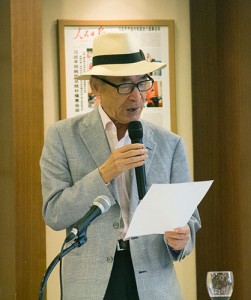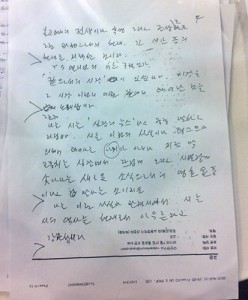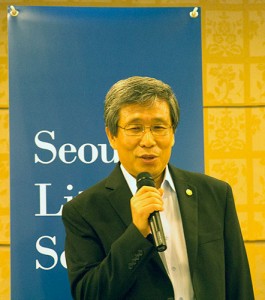I was lucky enough to attend the 37th (?) Swedish Literary Society meeting at the Foreign Press Club. This was a notable event because it brought internationally famous Korean poet Ko Un (here is his biography by Brother Anthony), back to the event (He also kicked off the series many years ago). The Swedish Ambassador Lars Danielsson (for the last time – he is leaving Korea) began by relating the time just before he left for Korea and was told that he didn’t need to read anything to understand Korea but the works of Ko Un. Then, Ko began.
NOTES ON KO’s TALK
Wearing a jaunty cap, Ko recalled that he was not only speaking this evening, but had in fact been the first guest ever at SLS and that it was proof of the international interest in literature. He also noted that most diplomatic work was focused on economic and political issues, but that literary gatherings such as the SLS built different kinds of links. He thanked the ambassador and Kim Seong-kon (President of LTI Korea) and talked about the importance of the listener/reader and building community between “those who know the sound of each other). He is an extremely literate speaker, liberally sprinkling quotes from a wide variety of writers and artists into his talk. Ko drew an implicit comparison between poetry and other writing, noting that poetry gushes out like blood. He also noted that although although his poetry is not of the west (and I think he partially blamed western writing for the “destruction of postmodernism), it is all part of a connected web of writing that does include western literature. He focused a bit on Dante and drew a line from the Epic of Gilgamesh to Li Po and to today. His focus, both geographically and in the stream of time, was on the idea that in some way all poetry is of one body, and is born of art not political theory.
“Poetry is a wave, or a dance.”
In the east there is a saying “you can dance automatically, and you can sing automatically.”
Ko then hopped back to the colonial era, when he lived in a famous rice-growing area, from which all the rice was taken and he lived in poverty. He was so hungry that when he looked at the stars they looked like something to eat, in fact he asked for one of them. His aunt responded that stars were not food, but were there to shine in the sky. This kind of memory forms the foundation of his poetry. In his late teens he wanted to die of consumption and die coughing up “hot red blood,” and created a fantasy in which this was true. He also imagined he had a sister who had died of TB, though he had none. This kind of (implied romantic) fantasy kept him alive in the post-war period, during the period of massacres.
In the 80s he was imprisoned for national security reasons, but let go partly because of support from outside of Korea. Then he was checked into a hospital for the first time and discovered that he had in fact once had TB, which had damaged one of his lungs. This is to show that fact and fiction and fantasy and reality have become one and the same thing. He claims that poetry brings those four things together: “The poet who is not a realist is dead, and the poet who is only a realist is dead.”
He also talked (and this makes sense in Korean, which often very onomatopoeic) at length about how words evoke the sounds they represent and joked that he hopes that someday just the world “alcohol” will get us all intoxicated. Of course, he also had a glass of wine in front of himself.^^
Then, the ambassador jumped to questions but was interrupted by staff who noted there should be a reading. Ko looked impishly delighted, and asked for a glass of wine. The ambassador responded, “please make it two.”
Ko noted that he could never read his poems sitting down, and stood up and read from his remarkable “A Biography” among other poems including several short poems that verged upon Zen koans (also vaguely reminiscent, with their ending twists, of the conceptual structure of sijo).
THE ROAD AHEAD
Let’s not say we’ve arrived.
Though it’s been ten thousand miles, the road to go is longer
than the road I’ve come.
When a day’s end comes on the way,
and I spend the night like a sleeping beast,
the road to go still lies ahead.
Though loneliness has kept me company,
it wasn’t loneliness alone;
it was the world
and the road ahead.
Surely it’s
an unknown world.
The wind is rising.DAYFLY
Three hundred-millions of a second.
If that’s how long one particle lasts
think how endless one day is.
You say a day’s too short?
You are greedyMOSQUITO
I’ve been bitten by a mosquito.
Thanks a million.
Why, I’m really alive.
Scratch scratch
Then it was short question and answer period and LTI Korea (who with the Swedish Embassy organize the SLS)Kim Seong-kon presented the ambassador with some departure gifts and it was on to dinner, and a highly entertaining chat with Ko, the Ambassador, an attache to the Danish Ambassador, and a couple of other folks.
Ko is a fairly relentless world traveller and lecturer (he mentioned he is on his way to Germany shortly) and his readings and presentation are fascinating. If he comes to your part of the world? Go out of your way to see him.





